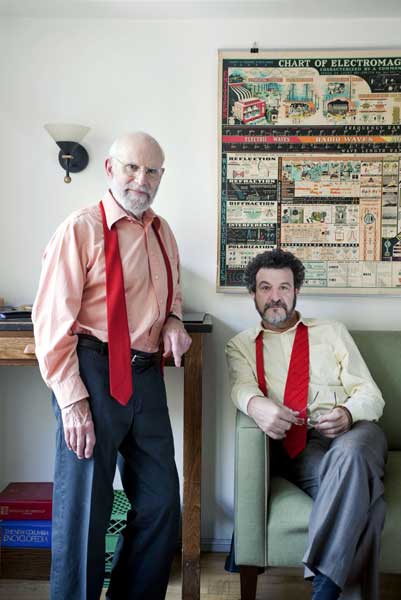How We Met: Oliver Sacks & Tobias Picker

Tobias Picker, 56, is an award-winning American composer whose work has been performed by the world's leading orchestras and opera houses. In addition to his symphonic and chamber music, song cycles and concertos , he has written four operas, including 'An American Tragedy' and children's opera 'Fantastic Mr Fox'. He lives in New York
Judith Rossner, the author of the novel on which my first opera Emmeline was based, introduced me to a friend of Oliver's – the man who was the model for Robert De Niro's character in the film Awakenings. I gave a dinner party and he brought Oliver with him. I was very interested in meeting Oliver because I thought he could help me. My own Tourette's went undiagnosed until I was in my thirties, as nobody knew what it was when I was a child. I grew up with a great deal of shame. Today it's not the same, largely because Oliver has written so much and with such compassion.
Before the dinner I took some Valium. I don't take it usually, which made it particularly effective, virtually eliminating my tics for the evening – at that point I was still trying to hide them – so it was totally counterproductive to my reason for wanting to meet Oliver. The next day, I asked Oliver's friend what he'd said about my Tourette's. He'd told him it was a "negligible case". I was very disappointed.
We gradually became friends, though. I certainly identify with him an artist. His book Awakenings is a masterpiece for many reasons, one of which is the dazzling writing. I've never been his patient, but a few years after that dinner party, I was filmed at a rehearsal without my knowledge. I was having a huge Tourette's attack at the time and I saw it and was very upset. It brought back terrible memories of my childhood. I thought Oliver should see it, so I took it to him. It was the first time we really talked about it. He was interested to know what I thought about it, and nobody had ever asked me that. He has this wonderful empathy, and I guess the fact that he was interested in my music and my Tourette's together helped me. It made me see my music in a different way – is the Tourette's present in it? I believe it is.
Oliver does things in a way unlike other people. He was writing Uncle Tungsten a few years ago, and he had specimens of the chemical elements all over his office and apartment – including uranium on the piano. It was around my 50th birthday and he handed me this small ball, very heavy, and said, "That's tin, the 50th element" and he gave it to me as a birthday present.
Once he came to a premiere of mine wearing a beautiful, bright-red tie and I commented on it. He just took it off, hung it around my neck and said, "It's yours." That's very him – he's a sweet, generous, fascinating man. I adore him.
Oliver Sacks, 77, is a British neurologist and author, best known for his collections of neurological case histories, including 'The Man who Mistook his Wife for a Hat' (1985) and 'Musicophilia: Tales of Music and the Brain' (2007). His 'Awakenings' (1973) inspired the film of the same name. 'The New York Times' has referred to him as 'the poet laureate of medicine'. He is professor of neurology and psychiatry at the Columbia University Medical Center. He lives in New York
I met Tobias in 1990, but as a neurologist I'd already been thinking about whether neurological disorders might colour or flavour a person's creativity.
A good friend of mine, a Parkinsonian artist called Ed Weinberger, said he would like me to meet a composer friend of his who had Tourette's. I had met visual artists and performers with Tourette's, but not a composer. Almost immediately I fell under the spell of his music. I liked him very much as an individual, too, and almost forgot he had Tourette's. The first time I mentioned him in print was in the preface to The Island of the Colorblind, where I referred to the effect a piece of his music called The Encantadas had on me. I was almost hypnotised by it and would play it again and again on the cassette in my car.
Tobias's music is extremely varied, at times stormily so, and I wondered whether this exuberance of imagination had anything to do with his Tourette's. A few years later I wrote about him, this time in Musicophilia. I quoted something Tobias had said: "I live my life controlled by Tourette's. But I use music to control it."
He seems much more comfortable with it than when I first met him. Tourette's is a public disorder but I think Tobias now feels at ease and doesn't feel called upon to apologise. He'd be a fine composer without it, but he's not entirely sorry he has it. I think it excites the musical imagination.
Though Tobias was not my patient, his Tourette's would come up in different ways and maybe discussing it has helped.
We see each other several times a year and speak a lot about music. He's genial, generous and open but also, like all creative artists, he needs long periods of solitude, which one has to respect. But when we see each other, we have long walks and meals together. I think in our different ways, practising our different arts, we admire each other. I certainly admire his music.
'Awakenings', a ballet inspired by Oliver Sacks' book and featuring specially commissioned music by Tobias Picker,is touring the UK until 4 December. For venues and tickets: rambert.org.uk
Join our commenting forum
Join thought-provoking conversations, follow other Independent readers and see their replies
Comments
Bookmark popover
Removed from bookmarks